8 Tips to Reduce the Risk of Ovarian Cancer
As with all cancers, ovarian cancer can be a devastating diagnosis. However, the good news is that there are certain steps or ways that can be followed in order to reduce the risk of developing this life-threatening disease. By being aware of the potential risk factors associated with ovarian cancer, women can take control over their health and make informed decisions that could very well save their lives.
Knowing the warning signs and potential triggers can help women create a plan of action to reduce the risk of ovarian cancer and promote a healthier lifestyle. By doing so, they can be proactive in protecting their well-being and potentially avoid a devastating diagnosis.
To that end, this article will provide tips on how to reduce the risk of ovarian cancer, including lifestyle changes and medical interventions. By learning more about the disease and taking action to reduce risk factors, women can help lower their chances of developing this potentially devastating condition.
Moreover, prior to gaining an understanding of the ways in which the risk of ovarian cancer can be reduced, it is important to have a comprehensive knowledge of the condition. Therefore, you must go through the following information very carefully if you are looking for ways to reduce the risk of ovarian cancer:
What is ovarian cancer?
Ovarian cancer is a serious and life-threatening condition that can have a devastating impact on the lives of many women. This type of cancer is a form of malignancy that targets the female reproductive organs known as the ovaries. It is a serious medical condition that can have potentially fatal consequences if not treated in a timely manner.
In fact, studies have shown that an estimated 22,000 women in the United States are diagnosed with ovarian cancer annually, and unfortunately, 14,000 of them succumb to the disease each year. Symptoms of ovarian cancer can be subtle and difficult to recognize, but can include abdominal pain or pressure, bloating, a feeling of fullness, or frequent urination. Sad to say, most cases of ovarian cancer are only detected when they are already in their advanced stages, making them harder to treat.
All things considered, early detection or diagnosis is the key to improving survival rates, and regular screening is recommended for women who are at an increased risk of ovarian cancer. Treating ovarian cancer usually involves a combination of surgery, chemotherapy, and radiation.
When addressed promptly and correctly, many women have the opportunity to live long and fulfilling lives following a diagnosis. With the right medical attention and response, ovarian cancer can be a manageable diagnosis.
Apart from that, there are steps that a woman can take in a bid to reduce the risk of developing this grave condition. The following are eight excellent tips that are believed to minimize the risk of ovarian cancer in females:
Maintain a healthy body weight
It is essential to recognize the importance of maintaining a healthy weight in order to reduce the risk of ovarian cancer. Maintaining a healthy weight is achievable by following a nutritious diet on a regular basis and maintaining an active lifestyle. A well-rounded and wholesome diet should consist of a variety of fresh (and especially green) vegetables and fruits, whole grains, lean proteins, and healthy fats.
Moreover, it is also important to limit unhealthy sugar-sweetened beverages as well as processed foods. Incorporating regular physical activity into one's daily routine is also a key factor for optimal health. Exercise can boost metabolism, burn calories, and lead to a better overall state of wellness.
Along with participating in regular physical activity, it is also important to get adequate rest and drink plenty of water to stay hydrated. By making lifestyle changes, individuals can help reduce the risk of ovarian cancer and maintain a healthy weight.
Avoid hormone replacement therapy
It is essential for individuals to be aware of the potential risks associated with hormone replacement therapy (HRT). While HRT can provide a variety of benefits, including reducing hot flashes and other menopausal symptoms, research has linked its use to an increased risk of ovarian cancer.
Therefore, it is essential for individuals to discuss any potential hormone replacement therapy with their doctor before starting a course of treatment. All benefits and risks should be carefully thought about and weighed in order to determine the best course of action. By taking the time to discuss HRT with a medical professional, individuals can avoid potential risks and make an informed decision regarding their health.
Schedule regular screenings
It is important to get regular screenings for ovarian cancer in order to detect it early. Having a discussion with your doctor about the most appropriate screening schedule for your individual needs is the best way to ensure that ovarian cancer is detected as early as possible.
In many cases, this could mean the difference between life and death. Early detection of ovarian cancer can lead to more successful treatment and provide a much better prognosis for those affected by the disease. Therefore, it is essential to stay on top of regular screenings and to consult with your doctor on the best possible schedule for you.
Use of talcum powder should be limited
Recent studies have highlighted the potential link between the use of talcum powder and an increased risk of developing ovarian cancer. As a result, health professionals nowadays advise using talcum powder as little as possible to reduce the risk of developing this potentially fatal condition.
Although further research is required to definitively establish a causal relationship between talcum powder and ovarian cancer, prudence dictates that individuals should limit their exposure to the product in order to protect their health.
Avoid BPA exposure
BPA is commonly found in plastic food and beverage containers, water bottles, and the lining of canned foods. It can also be found in certain plastic toys and medical supplies. Exposure to BPA poses a significant health risk, especially for infants, young kids, and expectant mothers. Certain studies have suggested that BPA exposure can increase the risk of some serious medical conditions or diseases, including diabetes, obesity, reproductive problems, and ovarian cancer, among others.
It can also be hazardous to the development of the brain, endocrine system, and reproductive system. The best thing one can do to avoid exposure to BPA is to reduce their use of plastic products. One can try to choose items made from glass, ceramic, stainless steel, or cardboard instead of plastic.
Limit alcohol consumption
Alcohol consumption has also been associated with a higher risk of developing ovarian cancer. As such, it is strongly advised to limit one's alcohol intake or to abstain from it completely. Research has demonstrated that excessive alcohol consumption can contribute to a higher risk of developing ovarian cancer, so it is in one's best interests to exercise caution when it comes to drinking.
Furthermore, it is important to be aware that alcohol consumption can have long-term effects on one's health, and it is always best to err on the side of caution. Therefore, it is recommended that individuals limit their alcohol intake or abstain from it altogether to help reduce the risk of ovarian cancer.
Try having kids early
Women who have children earlier in life may be less likely to develop ovarian cancer than those who have children at a later stage. Research has suggested that women who have been pregnant and had a successful birth before the age of 26 have a much lower risk of ovarian cancer than those who have not.
These findings could be attributed to the fact that having a child before the age of 26 can reduce the level of hormones in the body, which can, in turn, reduce the risk of ovarian cancer. It is important to note that, while having children earlier in life may be beneficial in terms of decreasing the risk of ovarian cancer, it is still crucial to take steps to reduce the risk of cancer in any case, such as regular check-ups and a healthy lifestyle.
Quit smoking
Quitting smoking is a crucial step in reducing your risk of ovarian cancer. Many studies and reports suggest that smokers are at a greater risk than non-smokers of developing this type of cancer. Smoking increases the amount of carcinogenic substances that are deposited in the body, which can lead to the formation of cancerous cells.
Quitting smoking can help reduce this risk. In addition, quitting smoking can also help to improve your overall health, as smoking has been linked to a variety of other health conditions such as heart disease, stroke, and COPD.
No matter how long you have been smoking, quitting can help reduce your risk of ovarian cancer and improve your overall health. It is never too late to quit, and there is help available to support you on your journey. Speak to your doctor about the best options for quitting smoking and take advantage of the resources available to help you on your journey!
Conclusion
There are several lifestyle changes that can be made to reduce the risk of ovarian cancer, such as eating a healthy and balanced diet, maintaining a healthy weight, regularly exercising, avoiding the use of hormone replacement therapy, limiting alcohol consumption, quitting smoking, and avoiding any exposure to (especially secondhand) smoke. Additionally, women should also be aware of the signs and symptoms of ovarian cancer and schedule regular check-ups and screenings with their healthcare provider to ensure early detection and treatment.
It is important to remember that although there is no surefire way to prevent ovarian cancer, taking the necessary steps to reduce the risk can make a significant difference. By making the suggested lifestyle changes, every woman can help keep her risk of developing ovarian cancer at a minimum and increase her chances of early detection and successful treatment.



+1.svg)
